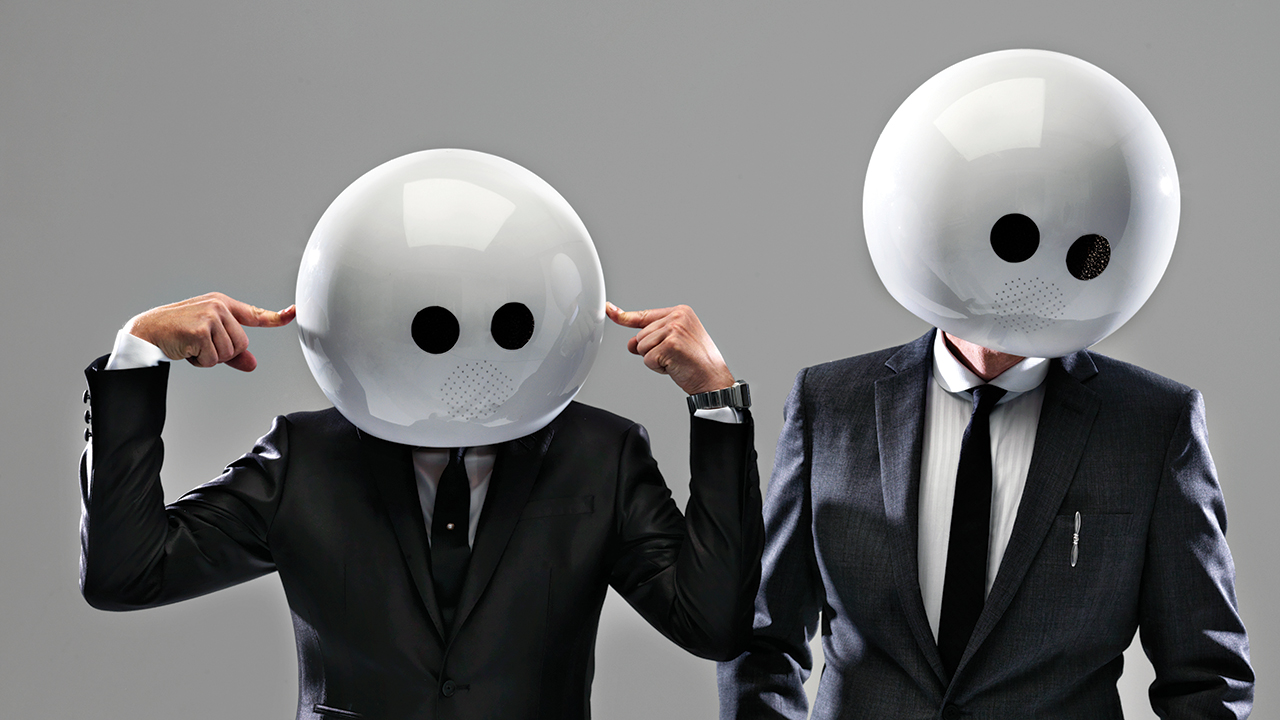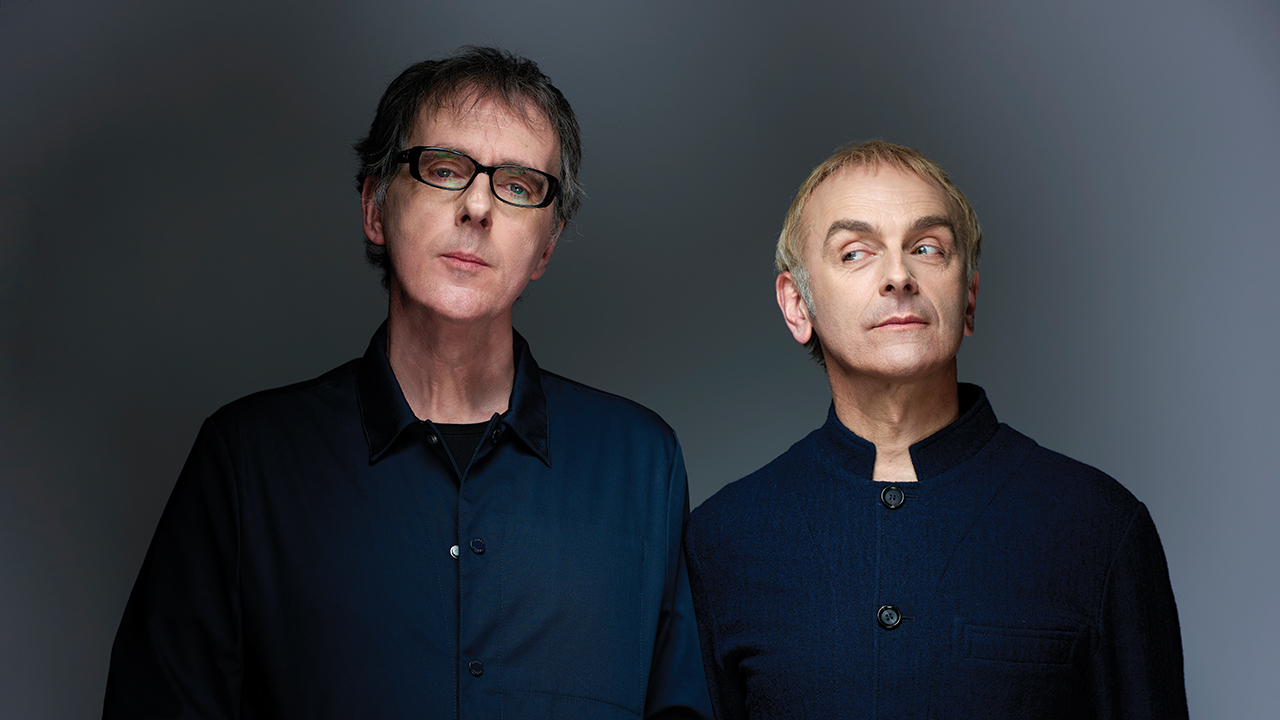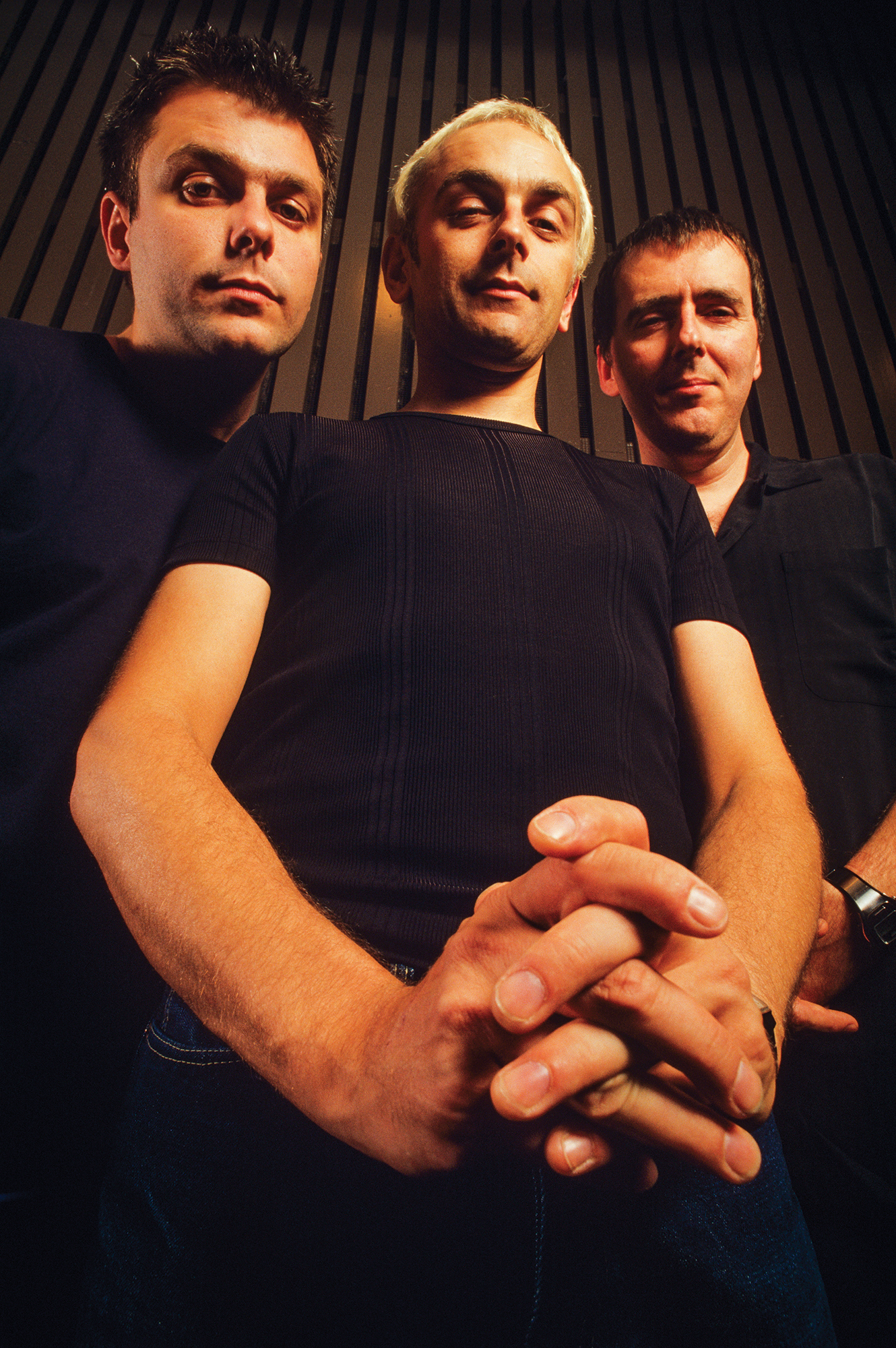
Prog and dance music? The idea may make you baulk, but when Prog spoke to dance outfit Underworld back in 2018 we discovered they grew up listening to ELP and Crimson, took tips from Hawkwind and Captain Beefheart and are true mavericks of music.
Multi-segmented 15-minute tracks. Rhythms that seem to trip you up, flip themselves inside out and then morph into a completely different beat. Impressionistic, cinematic soundscapes. Cryptic, surreal lyrics and found sounds. Co-opting of several different genres within the same track, including jazz, world and classical influences. Extended instrumental passages. Conceptually conceived sleeve artwork and thematically linked tracks.
Given all these characteristics in Underworld’s music, it’s hardly surprising that the first two genres listed on their Wikipedia entry begin with the word ‘progressive’. But while they may have made progressive house, or progressive trance, or experimental, avant-garde techno, were they prog?
Not particularly, if you consider prog to be a simple contraction of the term progressive rock, because for all the myriad varieties of music Karl Hyde and Rick Smith have made since they were first in a band together playing dub-influenced, oddball synth-pop in the early 80s, you’d struggle to label any of them ‘rock’.
But one thing Underworld have always been is true mavericks, of a kind that prog has always embraced and celebrated. And it turns out, once you get talking to their lyricist, vocalist and resident surrealist Karl Hyde, they have a lot more in common with the music elsewhere in this magazine than you might at first assume.
The first thing that disqualifies Underworld from true progness in some listeners’ eyes is that they’re a dance act. Because to some, dancing to prog is as sensible and desirable as hang gliding to astrophysics. And where are the guitars? Actually there are lots in Underworld’s music, but their sound is invariably warped electronically and thrown into a larger mix. But even if they are an electronic act, didn’t a huge boost to prog’s early development come from the use of groundbreaking, experimental electronic instruments such as the Mellotron? And since when were synthesisers not an essential part of prog’s classic sonic blueprint?
We also shouldn’t forget that early prog’s fingerprints were all over the early electronic music scene. There are few bands in history more influential than Kraftwerk, and they began life as a progressive art rock act, even if they cut their hair and swapped 22-minute one-side-of-an-LP compositions for shorter pieces before they made their best-known records. Krautrock was also a huge influence on electronica just as it inspired progressive rock, and Hyde points to it as a major influence.

“We both grew up listening to John Peel,” he explains, “and that encompassed everything from dub to prog to krautrock, so even when we began making electronic music, we brought all that stuff with us.”
Both dipped their toes in prog as fans growing up in the 70s, with Hyde recalling, “I was a huge Hawkwind fan. To me, that was techno before techno, trance before trance.
“We were both big ELP fans, and I’m sure if you look at our record collections back then you’d have seen Yes, Greenslade, King Crimson…”
Yet for much of the 1980s, Hyde and Smith were pursuing a career as more of a mainstream synth-pop act, but even then they had a desire to emulate heroes that had blended pop sensibility with an urge to experiment and resist categorisation. “Our early sound was based around bands like The Tubes,” he says, “but then our love of German electronic music took over, and that kind of spacey-sounding landscape music. Records like Bowie’s Low and a lot of film music connected with us, and that led us towards techno.”
According to Hyde, whenever they would find themselves “back on the dole” after another failed attempt at pop stardom, they would react by making “outsider music”. And then they suddenly found themselves part of a huge underground movement of like minds: acid house. But even then, he says he heard prog in the mix, and “great similarities between Tangerine Dream and acid house”.
The modern-day Underworld, referred to by band and fans, in distinctly progtastic style, as Underworld MkII, was born when DJ Darren Emerson joined them in 1990.
While he helped them develop a tighter techno basis to their sound, Smith and Hyde were inspired to try a different approach to writing music, one that broke them out of their previous generic shackles.
“I wanted to try a less traditional approach, so I started just wandering around writing what I saw, what I felt, as it occurred to me. Then Beefheart kept creeping in. I always loved the way he could use words. One of my favourite lyrics is on Shiny Beast, Tropical Hot Dog Night. The line ‘steppin’ out of a triangle into striped light’ really resonated with me. I started to study Beefheart’s view of the world, the way he paints, his lyrics, the things he describes, it just blows me away.”
Those influences can be heard in the surreal, stream-of-consciousness lyrical snatches punctuating Underworld’s music, an approach that first hit its stride on 1994’s dubnobasswithmyheadman. By that point, it was clear that Underworld
had an unfashionable yet very prog disregard for the constraints of the three-minute pop song or conventional pop or dance music templates. The album lifts off with the 13-minute journey through Mmm Skyscraper I Love You, which would end up being a favourite at the genre-agnostic Club Dog and Megadog rave nights that grew out of London then spread across the country in the early 90s. This scene fostered prog-friendly acts such as Ozric Tentacles and Eat Static as well as electronica legends such as Orbital.
“When we made dubno… and [1996 follow-up] Second Toughest In The Infants, our attitude was, would you ask Miles Davis to make a three-minute pop song? The music goes where it needs to go. The idea of a ‘chorus’ – what’s that? A noise recurring? A peak of energy? Maybe it’s a phrase, or a riff, but to us it was all part of the highs and lows of a journey, which we wanted to occur naturally, not have to turn up at rigidly determined intervals.”

Another proggy characteristic of some of Underworld’s best tracks is their penchant for unconventional, syncopated rhythms, and beats that mutate to disorientating yet hypnotic effect. Check out Juanita or Spoonman, M.E. It’s part of an approach to music that is happy to reveal layers of melodies, sounds and beats that unfold on repeated listens.
“We always said the singer should play supporting role to the rhythm section,” Hyde explains. “The vocalist is an oscillator, because the human voice is an exciting instrument that can make any sound you want. So the first two things you were meant to hear was the groove, and the bass, then later all the other melodies, and later people would say, ‘Oh, is that guy actually singing something there, oh wow! I’ve been listening to it for two years and I only just noticed that!”’
After a remix of Born Slippy .NUXX was included on the soundtrack to Trainspotting in 1996, Underworld were catapulted into dance music’s big league. And although they continued to make acclaimed, experimental records such as 1999’s Beaucoup Fish, Hyde feels they lost their way a little.
“As it got bigger and bigger, I think the dance scene lost this pirate spirit that was such a good aspect of outsider culture. We’d played in castles, up mountains, and old gun turrets or on beaches, then all of a sudden we were in health and safety meetings and the spirit of adventure was lost.”
Meanwhile, Hyde was finding that the party scene was having an adverse effect on him. “I was a performing alcoholic and it was killing me,” he admits. But once he called time on the 24-hour party, Underworld would continue to broaden their creative horizons, despite Darren Emerson leaving the band in 2001. The jazz-inflected Cups that opened 1999’s Beaucoup Fish was laced with classical-style orchestral motifs, while they were soon incorporating world music elements on 2002’s A Hundred Days Off.
For Hyde, this was a reflection of a musical landscape that had opened up considerably since the turn of the 90s.
“It was great to play to audiences that didn’t know anything about what genre we were from. That was fantastic – we’d be on before Korn or Metallica and that was amazing because we knew our challenge was to turn them on, even though at some gigs, the crowd would look at us as if they wanted us to die horribly and quickly. In the end, we’d invariably turn it round.”
He remains a big fan of genre-splicing, but belongs firmly to the ‘talent borrows, genius steals’ school of eclecticism. “When it’s just a case of sticking guitars onto techno, or a dance beat on a guitar track, it doesn’t do much for me. I like it when a band really hijack another genre. I grew up hearing progressive musicians using jazz or classical and incorporating German electronics into their sound. When you’d hear bands like Hawkwind or King Crimson, they took elements from lots of genres and assembled them together. If you like it, don’t just nick it – subvert it and take it on
a journey to somewhere else.”
Above all, what Underworld have in common with prog musicians is their desire to challenge themselves and their audience. As Prog speaks to Hyde, he’s working on a new piece with Smith, part of an ambitious plan to put out a new track every Thursday. Oh, and there’s a concept behind it too…
“We’re releasing tracks as a series with Drift as the title and main theme – whether that is the idea of drifting in the physical sense or, say, drifting as a car racing thing. It’s audio-visual, with accompanying films, but it’s really exciting because we have to come up with tracks every week – sometimes the day before release, we don’t even have a track, so Rick and I are like, ‘We’ve got to pull something out here.’ I find it refreshing to change from the old way where six months in advance the album’s done and you have to wait to put it out. Potentially, with this, we can release tracks whenever we want to, based on something we heard or an idea we had last night.”
That also links in to Tomato, the design and film collective the duo are part of, which has come up with their album sleeves and other multimedia events they’ve been part of.
“It goes back to Robert Fripp talking about small, independent mobile networks of intelligent people sitting outside corporate structures and exchanging ideas,” says Hyde. “We’ve taken that idea as a blueprint since 2000. So I guess we have Fripp to thank for how we do things. Is that prog enough for you?”
That’ll do nicely, thanks.







